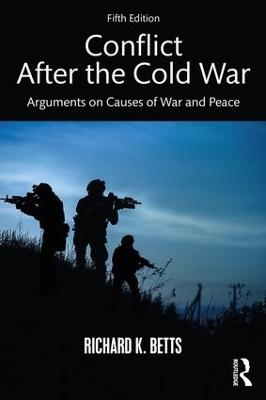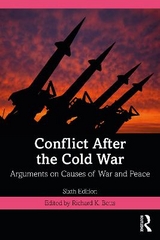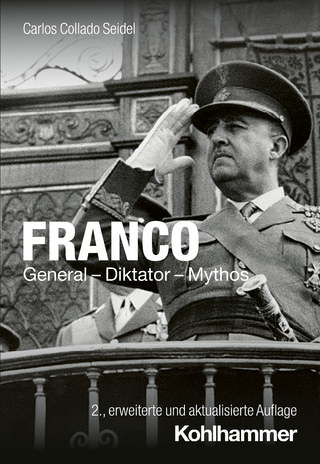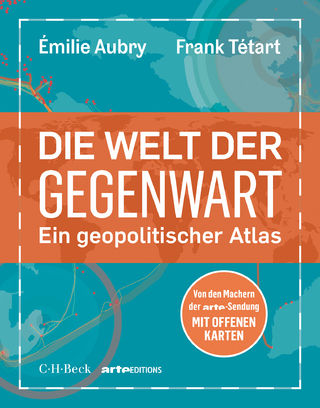
Conflict After the Cold War
Routledge (Verlag)
978-1-138-29069-3 (ISBN)
- Titel erscheint in neuer Auflage
- Artikel merken
New to the Fifth Edition:
Original introductions to each of 10 major parts as well as to the book as a whole have been updated by the author.
An entirely new section (Part IX) on "Threat Assessment and Misjudgment" explores fundamental problems in diagnosing danger, understanding strategic choices, and measuring costs against benefits in wars over limited stakes.
12 new readings have been added or revised:
Fred C. Iklé, "The Dark Side of Progress"
G. John Ikenberry, "China’s Choice"
Kenneth N. Waltz, "Why Nuclear Proliferation May Be Good"
Daniel Byman, "Drones: Technology Serves Strategy"
Audrey Kurth Cronin, "Drones: Tactics Undermine Strategy"
Eyre Crowe and Thomas Sanderson, "The German Threat? 1907"
Neville Henderson, "The German Threat? 1938"
Vladimir Putin, "The Threat to Ukraine from the West"
Eliot A. Cohen, "The Russian Threat"
James C. Thomson, Jr., "How Could Vietnam Happen? An Autopsy"
Stephen Biddle, "Afghanistan’s Legacy"
Martin C. Libicki, "Why Cyberdeterrence is Different"
Richard K. Betts is the Arnold Saltzman Professor of War and Peace Studies in the Department of Political Science, the director of the Institute of War and Peace Studies, and the director of the International Security Policy Program in the School of International and Public Affairs at Columbia University. He is also Adjunct Senior Fellow for National Security Studies on the Council of Foreign Relations, a commissioner to the National Commission on Terrorism, and former staff member of the Senate Intelligence Committee. His research interests include national security, military strategy, and international conflict, and he has published numerous articles on foreign policy, military strategy, intelligence operations, conventional forces, nuclear weapons, arms trade, collective security, strategic issues in Asia, and other subjects.
Preface
Part I. Visions of Conflict and Peace_____________________________________
Francis Fukuyama, "The End of History?"
John J. Mearsheimer, "Why We Will Soon Miss the Cold War"
Samuel P. Huntington, "The Clash of Civilizations?"
Fareed Zakaria, "Economics Trumps Politics"
Fred C. Iklé, "The Dark Side of Progress"
Part II. International Realism: Anarchy and Power_____________________________
Thucydides, "The Melian Dialogue"
Niccolo Machiavelli, "Doing Evil in Order to Do Good"
Thomas Hobbes, "The State of Nature"
Edward Hallett Carr, "Realism and Idealism"
Kenneth N. Waltz, "The Origins of War in Neorealist Theory"
Robert Gilpin, "Hegemonic War and International Change"
Geoffrey Blainey, "Power, Culprits, and Arms"
Part III. International Liberalism: Institutions and Cooperation_______________
Immanuel Kant, "Perpetual Peace"
Richard Cobden, "Peace Through Arbitration"
Woodrow Wilson, "Community of Power vs. Balance of Power"
Michael W. Doyle, "Liberalism and World Politics"
Robert O. Keohane and Joseph S. Nye, "Power and Interdependence"
John Mueller, "The Obsolescence of Major War"
Part IV. Psychology and Culture: The Human Mind, Norms, and Learning________
Sigmund Freud, "Why War?"
Stanley Milgram, "How Good People Do Bad Things"
Robert Jervis, "War and Misperception"
Richard Ned Lebow, "Spirit, Standing, and Honor"
Margaret Mead, "War is Only an Invention, Not a Biological Necessity"
J. Ann Tickner, "Men, Women, and War"
Part V. Economics: Interests and Interdependence__________________
Niccolo Machiavelli, "Money is Not the Sinews of War..."
Norman Angell, "The Great Illusion"
Geoffrey Blainey, "Paradise is a Bazaar"
V.I. Lenin, "Imperialism, the Highest Stage of Capitalism"
Joseph Schumpeter, "Imperialism and Capitalism"
Alan S. Milward, "War as Policy"
Kenneth N. Waltz, "Structural Causes and Economic Effects"
Richard Rosecrance, "Trade and Power"
G. John Ikenberry, "China’s Choice"
Part VI. Politics: Ideology and Identity_____________________________
Edward Mansfield and Jack Snyder, "Democratization and War"
Ernest Gellner, "Nations and Nationalism"
Chaim Kaufmann, "Possible and Impossible Solutions to Ethnic Civil Wars"
Radha Kumar, "The Troubled History of Partition"
Part VII. Military Technology, Strategy, and Stability__________________
Robert Jervis, "Cooperation Under the Security Dilemma"
Jack S. Levy, "The Offensive/Defensive Balance of Military Technology"
Kenneth N. Waltz, "Why Nuclear Proliferation May Be Good"
Daniel Byman, "Drones: Technology Serves Strategy"
Audrey Kurth Cronin, "Drones: Tactics Undermine Strategy"
Part VIII. Terrorism, Revolution, and Unconventional Warfare________
Martha Crenshaw, "The Logic of Terrorism"
Osama bin Ladin, "Speech to the American People"
T. E. Lawrence, "Science of Guerrilla Warfare"
Mao Tse-tung, "On Guerrilla Warfare"
Samuel P. Huntington, "Patterns of Violence in World Politics"
David Galula, "Insurgency and Counterinsurgency"
Eliot Cohen, Conrad Crane, Jan Horvath, and John Nagl, "Principles, Imperatives, and Paradoxes of Counterinsurgency"
Gian P. Gentile, "A Strategy of Tactics: The Folly of Counterinsurgency"
Part IX. Threat Assessment and Misjudgment: Recurrent Dilemmas
Eyre Crowe and Thomas Sanderson, "The German Threat? 1907"
Neville Henderson, "The German Threat? 1938"
Vladimir Putin, "The Threat to Ukraine from the West"
Eliot A. Cohen, "The Russian Threat"
James C. Thomson, Jr., "How Could Vietnam Happen? An Autopsy"
Stephen Biddle, "Afghanistan’s Legacy"
Richard K. Betts and Thomas J. Christensen, "China: Can the Next Superpower Rise Without War?"
Part X. New Threats and Strategies for Peace______________________
Thomas F. Homer-Dixon, "Environmental Changes as Causes of Acute Conflict"
Martin C. Libicki, "Why Cyberdeterrence is Different"
G. John Ikenberry and Anne-Marie Slaughter, "A World of Liberty Under Law"
Samuel P. Huntington, "Peace Among Civilizations?"
| Erscheinungsdatum | 03.06.2017 |
|---|---|
| Verlagsort | London |
| Sprache | englisch |
| Maße | 152 x 229 mm |
| Gewicht | 929 g |
| Themenwelt | Geschichte ► Allgemeine Geschichte ► Zeitgeschichte |
| Geisteswissenschaften ► Geschichte ► Regional- / Ländergeschichte | |
| Sozialwissenschaften ► Politik / Verwaltung ► Staat / Verwaltung | |
| ISBN-10 | 1-138-29069-6 / 1138290696 |
| ISBN-13 | 978-1-138-29069-3 / 9781138290693 |
| Zustand | Neuware |
| Informationen gemäß Produktsicherheitsverordnung (GPSR) | |
| Haben Sie eine Frage zum Produkt? |
aus dem Bereich



